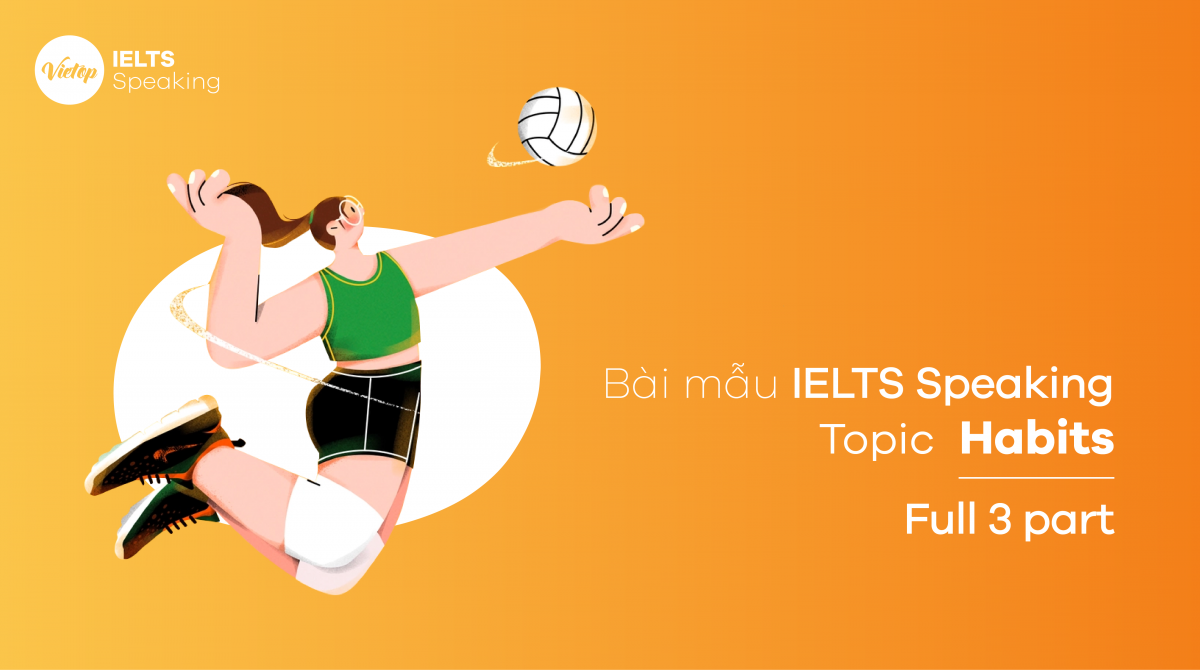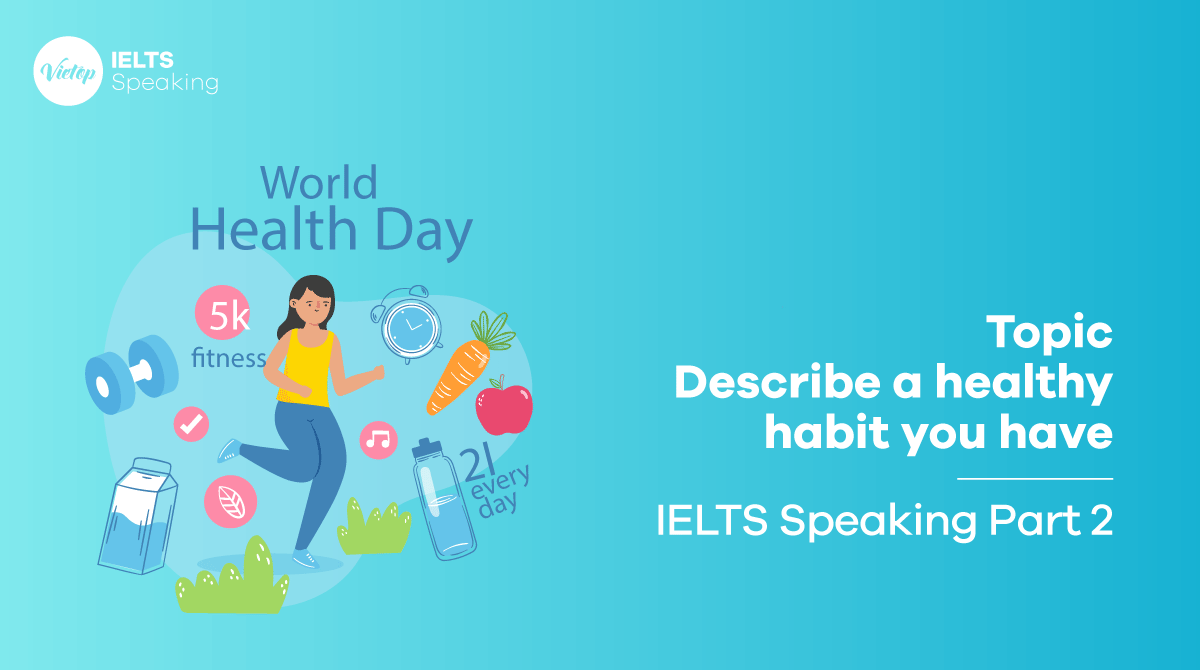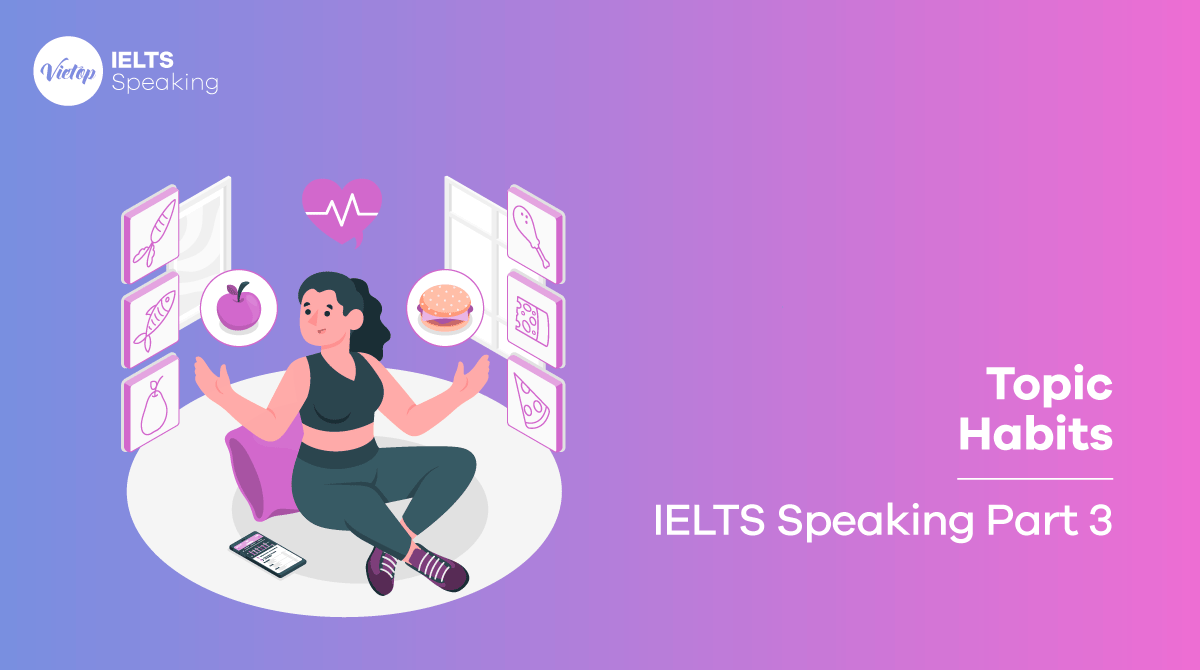IELTS Vietop gửi đến bạn bài mẫu IELTS Speaking về topic Habits, cùng tìm ý tưởng ngay bên dưới bài viết sau và thực hành ngay nhé!
1. Bài mẫu topic Habits – IELTS Speaking part 1

1.1. Do you have any good habits?
I can say that I have a bunch of good habits, one of which is doing vigorous regular exercise. I’ve been taking up jogging since I was in high school, as at the time I was a bit overweight. Jogging has changed my life upside down, since it doesn’t only help me to burn plenty of calories to maintain a healthy weight, but it’s also a way to uplift my mood whenever I feel stressed out.
- Vigorous (adj): mạnh mẽ, đầy khí lực
- Change one’s life upside down: thay đổi cuộc đời hoàn toàn
- Uplift my mood: cải thiện tâm trạng
- Stressed out (adj): bị căng thẳng, áp lực
1.2. Are there any bad habits you want to change?
Sure. No one is perfect and I have a lot of bad habits that I’m trying to get rid of, one of which is probably biting my nails. I picked up this habit when I was a child and it now has become an ingrained self-mutilative behavior of mine. I know that biting my nails can cause me illness due to passing bacteria and viruses from my fingers to my mouth, but it’s difficult to manage.
- Get rid of s.th: loại bỏ thứ gì đó
- Ingrain (v): khắc sâu, ăn mòn
- Self-mutilative (adj): làm tổn thương bản thân
Xem thêm: Cách học bảng chữ cái tiếng Anh
1.3. Do you think your habits say something about your personality?
I genuinely believe they do. In fact, I believe every single thing we do is an accurate assessment of our character traits. To me, my habit of biting my nails, a body-focused repetitive behavior, shows that I long for perfection, as that action is something I do to soothe my boredom, irritation, and dissatisfaction.
- Accurate (adj): chính xác
- Assessment (n): sự đánh giá
- Repetitive (adj): lặp đi lặp lại
- Long for (v): trông mong, ao ước
- Soothe (v): làm dịu
1.4. Is there anything you want to take up as a new habit?
I would like to read more frequently on a daily basis. Every night before bed, all I seem to do is holding my phone and scrolling through a never-ending list of posts and videos on social media, and it jeopardizes my eyesight in different ways. If I could replace my iPhone with something like books, I would definitely avoid eyestrain and of course, get some more beneficial knowledge.
- Jeopardize (v): gây hại
- Eyesight (n): thị lực
- Eyestrain (n): mỏi mắt
Audio
Xem thêm: Khóa học IELTS 1 kèm 1 – Chỉ 1 thầy và 1 trò, cam kết đầu ra

Nhận tư vấn miễn phí khóa học hè
2. IELTS Speaking part 2: Describe a healthy habit you have/ Talk about your habits
You should say:
- What that habit it is
- How long you’ve had this habit
- How often you do it
And explain why you think it’s a healthy habit.

Sample
So…today I would like to talk about running, a form of exercise that has long been in my daily schedule.
I first took up this habit about 7 years ago, when I was still a teenager. At the time I was a bit overweight and felt extremely upset about how I looked. You know it’s normal to face some emotional ups and downs during one’s teenage years, but if a person had to deal with extra weight, it might add to these feelings. After years of being teased and bullied at school because of my appearance, I decided to put my running shoes on and it has changed my life upside down.
The difference between running and jogging is intensity. Running is much faster, uses more kilojoules and demands more effort from the heart, lungs and muscles and it requires a higher level of overall fitness. This is not easy at all for newbies, as I could not push myself too hard right from the beginning.
I started each run with a gentle warm-up for at least 5 minutes. This included walking, marching on the spot, knee lifts, side stepping or climbing stairs. I didn’t want to suffer any injuries while doing the exercise, so I tried to ease myself into running slowly and increase my pace and distance gradually over several outings.
After only about 3 months into running, I managed to lose a total of 5 kilograms, which left me flabbergasted as I never believed I could achieve such a goal. Now I’m as fit as a fiddle, and no longer worry about my weights, but running has done wonders to my bones, muscles and cardiovascular fitness so I would like to keep doing it in the future.
- Emotional ups and downs (n): những cảm xúc vui và buồn
- Put one running shoes on: mang giày chạy (chỉ việc đi chạy bộ)
- Newbie (n): người mới
- Push oneself (v): ép bản thân
- Pace (n): bước chạy
- Flabbergasted (adj): kinh ngạc
- As fit as a fiddle: vô cùng khỏe mạnh
- Do wonders: có tác động tuyệt vời
- Cardiovascular fitness: sức khỏe tim mạch
Audio
3. Bài mẫu topic Habits – IELTS Speaking part 3

3.1. What kinds of habits should children have?
From a tender age, children should definitely be introduced to healthy eating. Most kids incline towards fast food or sweets, which can devastate their health conditions as they grow. Though leading children to a more healthy and balanced diet is not easy, parents can make them believe that even healthy food can taste equally good by adding more colors or making homemade versions of noodles, cakes, cookies, and pizzas.
Added to that, physical activities should be cultivated early in their lives, especially in this age of technology. Sitting all day in front of the TV or computer screen would result in them being obese or emotionally and socially insufficient.
- Incline towards s.th (v): hướng về cái gì
- Cultivate (v): nuôi dưỡng
- Obese (adj): mắc bệnh béo phì
- Emotionally/ socially insufficient (adj): kém phát triển về mặt cảm xúc/ xã hội
3.2. How can parents teach their children good habits?
Well, I haven’t got married or had kids so I’m not an expert in parenting at all. But from my observation, most children look up to their parents throughout their lives. Parents are always a point of reference for their baby boys and girls, and they unconsciously imitate their parents’ behaviour and actions.
Therefore, there’s no better way to educate children than to set a good example for them. Inculcating the right manners and healthy habits for children can feel like an uphill battle sometimes, since this is not something that can be achieved overnight, but parents should be patient with their little ones.
- Not an expert: không phải là chuyên gia (nói khi không có nhiều kiến thức về lĩnh vực nào đó)
- Look up to s.o: ngưỡng mộ ai đó
- Reference (n): sự tham khảo
- Set a good example: Làm gương
- Inculcate (v): khắc sâu vào tâm trí
- Feel like an uphill battle (n): một cuộc chiến cam go
3.3. Do you think people change their habits as they get older?
I do think habits change with age. As people grow older, many aspects of their life change, either for the better or for the worse, and their daily habits are adjusted accordingly. It can be seen that old habits no longer produce the outcome they desire or might be inappropriate to keep due to their new living environments or new ways of thinking.
Some of the most common rituals that people take up when getting older are related to their wellness, including exercising regularly, avoiding or limiting alcohol consumption and taking vitamins and supplements. In addition, certain behaviour like eating sweets or watching cartoons are often considered childish by many, so peer pressure also plays a key role in habit alterations.
- Outcome (n): kết quả
- Inappropriate (adj): không phù hợp
- Ritual (n): thói quen
- Wellness (n): sức khoẻ
- Peer pressure (n): áp lực đồng trang lứa
- Play a key role in s.th: đóng vai trò quan trọng
- Childish (adj): giống trẻ con
- Alteration (n): sự thay đổi
Trên đây là bài mẫu IELTS Speaking về chủ đề Habits mà Vietop đã gợi ý cho bạn. Hy vọng những chia sẻ trên sẽ giúp bạn có thêm nhiều ý tưởng và từ vựng hơn để tự tin thể hiện phần thi IELTS Speaking tốt nhất nhé!











